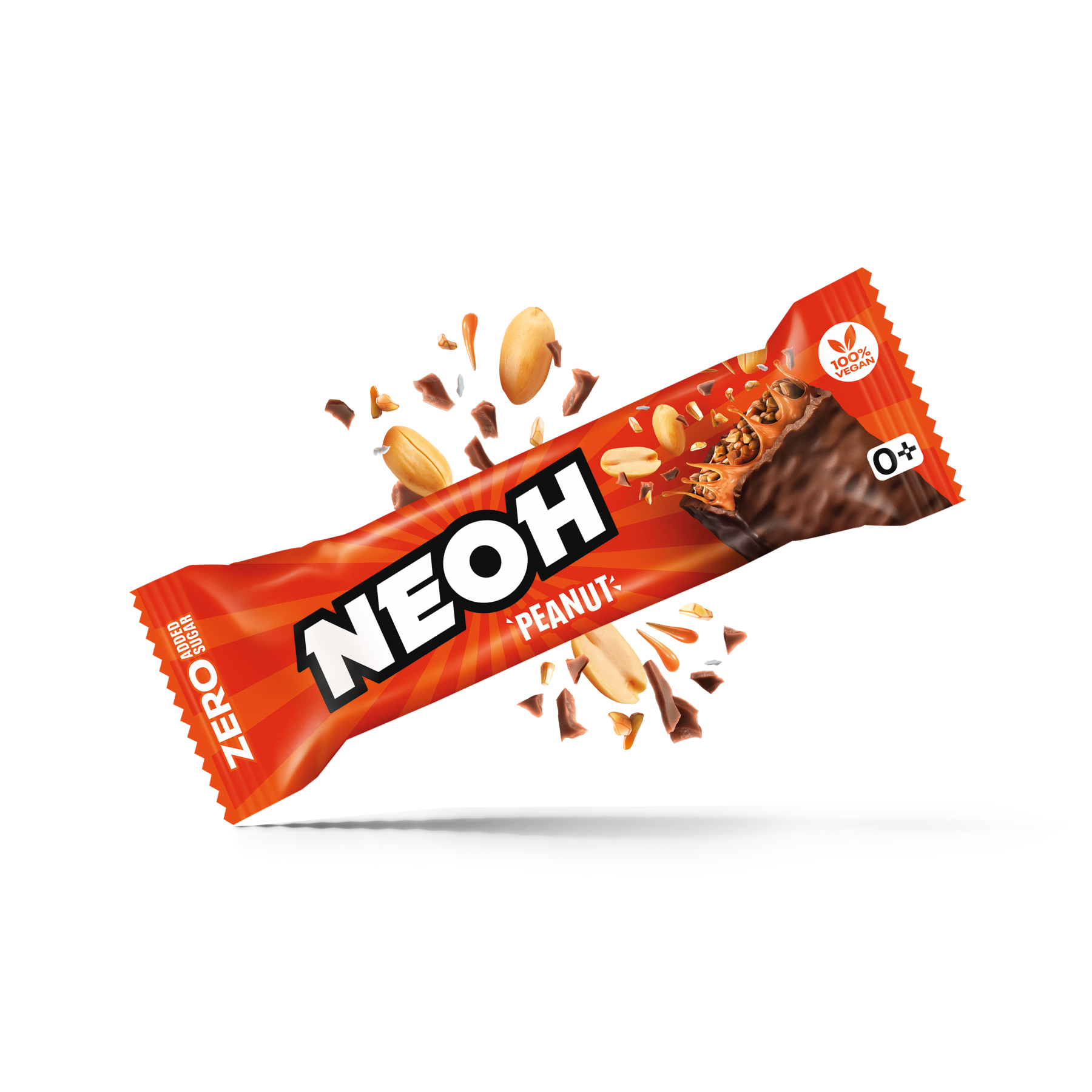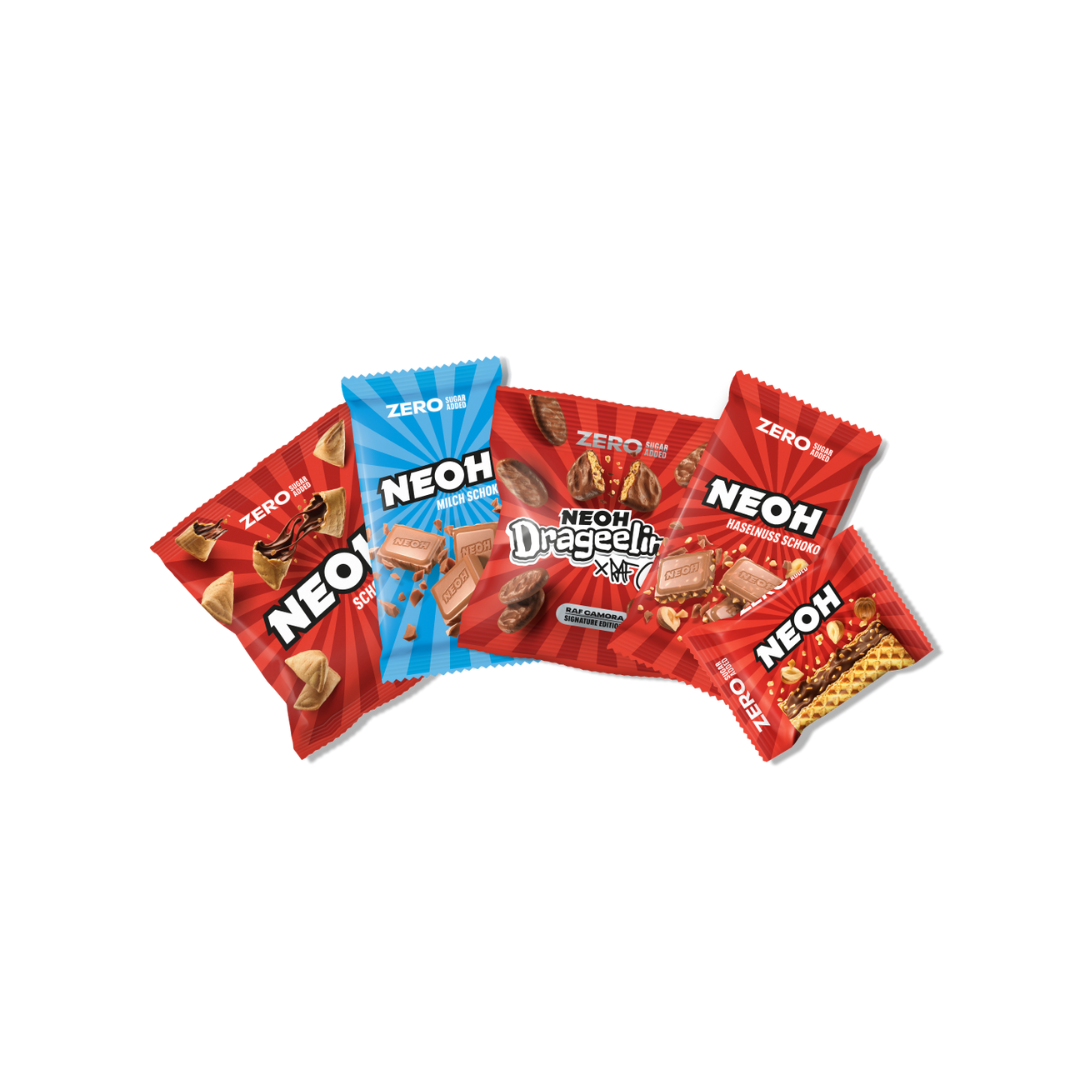THE NEOH WAY OF SNACKING
THE NEOH WAY OF SNACKING
WE WANT TO EVOLUTIONIZE SNACKING FOR THE LONG RUN!
NEOH not only tastes good, but is also good for our planet and the people that live on it. With these topics we do not make compromises:
#FIGHTSUGAR
Here are some facts, where sugar is bound to get stuck in your throat. The World Health Organization (WHO) states that the daily sugar intake (added sugar as well as natural sugar in fruits and honey) should be limited to 5% of the total calorie intake. (see WHO Guideline, 2015) Why? Because sugar intake has already been recognized as key risk factor for obesity, type 2 diabetes and heart disease. (cf. Debras et al., 2020, p. 1) Sugar in its various forms glucose, fructose and sucrose also plays a central role in the development of caries. (cf. Wölnerhanssen, 2020, p. 483) More information on the health effects of sugar consumption can be found HERE.
It is not without reason that there countries are already forced to introduce drastic measures such as e.g. a tax on sweet drinks in order to reduce consumption, which has actually already been successful. The raw material sugar is however still a cheap filler and helps food manufacturers to make their products tastier. (cf ibid, p. 480)
On top of that, it was already proven back in 2009 on rats that sugar is just as addictive as heroin and cocaine. The German alternative practitioner Inke Jochims even goes so far as to claim that "sugar is a drug". (see https://www.foodaktuell.ch)
An absolute NO GO for NEOH.
#FIGHTPALMOIL
Palm oil is not only the cheapest but also the most popular fat in the food industry. (see Fabricius, p.1) But why don't we use it? For us, clearly because we do not want to make money by clearing the rainforest and damaging the entire global climate. (cf. ibid) Furthermore, the habitat of a large number of animals and plants is endangered or destroyed during the extraction of palm oil. (cf. Wegmann, 2019, n.p.)
Not to ignore are also the health effects on humans, because palm oil exhibits a much higher percentage of saturated fats, which are to be avoided rather in the comparison with other vegetable oils. A study by Sun et al. (see 2015) shows, among other things, that the consumption of palm oil can lead to side effects such as increased mortality from ischemic heart disease or an increased risk of cardiovascular disease. It could also be shown that palm oil significantly increased LDL cholesterol compared to other vegetable oils with a lower content of saturated fat. Likewise the HDL Cholesterin value increases due to the consumption of palm oil. (see ibid)
We therefore refrain entirely from including palm oil in the recipe of our products. You want to learn more about palm oil? Then have a look at the following article HERE from Greenpeace. After that palm oil will no longer be on your menu, I promise!
#FIGHTPLASTIC
We avoid plastic wherever possible and where it makes sense in terms of sustainability. One of the reasons is that plastic, due to its ubiquity combined with its durability, causes problems in our environmental system, especially in the form of microplastics. And this can now be found almost everywhere in the world - in the pack ice of the poles, in the oceans or even as fine dust in our air. (see Florides/Lenk, 2020, p. 13)
You can find more information HERE.
No matter if it's the shipping of our bars and merch or our promotion materials. Also our bars will soon get a more sustainable packaging without you, our customers, having to pay the extra charge. To make sure that the quality of our bars does not suffer from inferior but sustainable packaging, we have already been working on a solution that satisfies us in both areas for years.
OUR #NEOHLOGIC
In summary, the following applies to us: If everyone is doing well, then we are also doing well. That is why we treat our customers, partners and employees as we would like to be treated ourselves, and why we eliminate short-sighted or egocentric approaches from our actions. In addition, we always pay attention to our partners' demands on sustainability when selecting them. For example, we have chosen Continental Clothing as the manufacturer of our merch- one of the leading manufacturers in terms of ethically responsible production, which, among other things, adheres to the following social responsibility principles: no child and forced labor, safe working conditions, living wages and no discrimination against employees.
We want to show that if we all live more consciously, not only our nutrition will change for the better, but a lot more.
LET’S DO THIS TOGETHER! BE THE CHANGE YOU WANT TO SEE IN THE WORLD!
QUELLEN:
Charlotte Debras, Eloi Chazelas, Bernard Srour, Emmanuelle Kesse-Guyot, Chantal Julia, Laurent Zelek, Cédric Agaësse, Nathalie Druesne-Pecollo, Pilar Galan, Serge Hercberg, Paule Latino-Martel, Mélanie Deschasaux, Mathilde Touvier (2020): Total and added sugar intakes, sugar types, and cancer risk: results from the prospective NutriNet-Santé cohort; In: The American Journal of Clinical Nutrition; https://doi.org/10.1093/ajcn/nqaa246
World Health Organisation (WHO) (2015): Sugars intake for adults and children: Guideline. Geneva. http://public.eblib.com/choice/publicfullrecord.aspx?p2033879.
Wölnerhanssen, Bettina K. (2020): Raffinierter Zucker – Wertvolle Energie oder physiologischer Unsinn? In: Quintessennz Zahnmedizin, 5th edition, p. 480-487
https://www.foodaktuell.ch/2009/01/06/versuche-mit-ratten-zucker-macht-suechtig/, retrieved on 20.10.2020
Fabricius, Tatjana (2019): Klima-Killer Palmöl - Grenzen und Möglichkeiten von Private Policy Networks in der globalen Umweltpolitik. Wiesbaden: Springer Fachmedien Wiesbaden GmbH; https://doi.org/10.1007/978-3-658-28012-3
Wegmann C. (2020) Ethisches Lebensmittelmarketing. In: Lebensmittelmarketing. Springer Gabler, Wiesbaden. https://doi.org/10.1007/978-3-658-26038-5_7
Sun, Ye; Neelekantan, Nithya; Wu, Yi; Lote-Oke Rashmi; Pan, An; van Dam; Rob M (2015): Palm Oil Consumption Increases LDL Cholesterol Compared with Vegetable Oils Low in Saturated Fat in a Meta-Analysis of Clinical Trials. In: J. Nutri, p. 1549-58
Völker, Carolin; Kramm, Johanna; Sattlegger, Lukas; Zimmermann, Lisa; Bentheimer, Patrick; Elfers, Franziska; Florides, Paula; Feilberg, Nils; Feucht, Viktoria; Holzer, Theresa; Höfner, Katharina; Lenk, Kevin; Malcherowitz, Kira; Munder, Wolf; Rahmer, Judith; Savelyeva, Sofiya(2020): Sozial-ökologische Exklursion„Plastik in der Umwelt“. p. 1-97



